Filter by

Digital Light
Light symbolises the highest good, it enables all visual art, and today it lies at the heart of billion-dollar industries. The control of light forms the foundation of contemporary vision. Digital Light brings together artists, curators, technologists and media archaeologists to study the historical evolution of digital light-based technologies. Digital Light provides a critical account of the …
- Edition
- -
- ISBN/ISSN
- 9781785420009
- Collation
- -
- Series Title
- -
- Call Number
- -
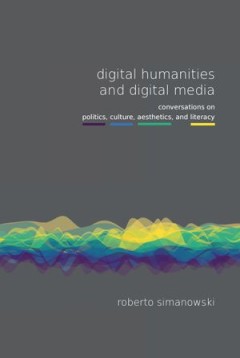
Digital Humanities and Digital Media Conversations On Politics, Culture, Aes…
There is no doubt that we live in exciting times: Ours is the age of many ‘silent revolutions’ triggered by startups and research labs of big IT companies; revolutions that quietly and profoundly alter the world we live in. Another ten or five years, and self-tracking will be as normal and inevitable as having a Facebook account or a mobile phone. Our bodies, hooked to wearable devices sitt…
- Edition
- -
- ISBN/ISSN
- 9781785420306
- Collation
- -
- Series Title
- -
- Call Number
- -

Constructions of Cultural Identities in Newsreel Cinema and Television after …
Newsreel cinema and television not only served as an important tool in the shaping of political spheres and the construction of national and cultural identities up to the 1960s.
- Edition
- -
- ISBN/ISSN
- 9783837629750
- Collation
- -
- Series Title
- -
- Call Number
- 070.1 SCH c

Como o Mundo Mudou as Mídias Sociais
How the World Has Changed Social Media is the first book by Why We Post, a book series that investigates the findings of nine anthropologists who have spent 15 months living in communities in different parts of the world, including Brazil, Chile, China, England, India, Italy,
- Edition
- -
- ISBN/ISSN
- 9781787356542
- Collation
- -
- Series Title
- -
- Call Number
- 070.1 MIL c
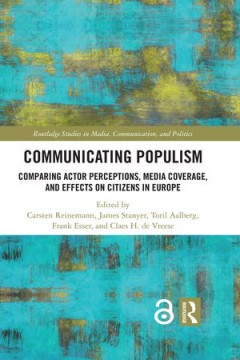
Communicating Populism; Comparing Actor Perceptions, Media Coverage, and Effe…
The studies in this volume conceptualize populism as a type of political communication and investigate it comparatively, focusing on (a) politicians’ and journalists’ perceptions, (b) media coverage, and (c) effects on citizens.
- Edition
- Ed. 1
- ISBN/ISSN
- 0429687850, 9780429687853
- Collation
- -
- Series Title
- -
- Call Number
- 302.23 REI c

Being a Young Citizen in Estonia An Exploration of Young People’S Civic an…
The book gives an intriguing insight into how young people in Estonia, twenty years after the establishment of democracy, perceive their own role as citizens. It does so in a theoretical framework that stresses the embeddedness of the civic experiences in a media-dominated environment, thus closely linking civic and media experiences. Based on the analysis of both qualitative interview data and…
- Edition
- -
- ISBN/ISSN
- 9789949322749
- Collation
- -
- Series Title
- -
- Call Number
- -
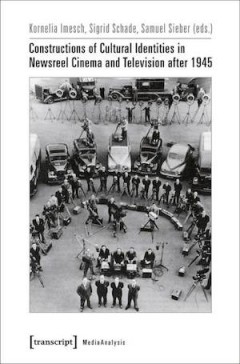
Constructions of Cultural Identities in Newsreel Cinema and Television after …
Newsreel cinema and television not only served as an important tool in the shaping of political spheres and the construction of national and cultural identities up to the 1960s. Today's potent televisual forms were furthermore developed in and strongly influenced by newsreels, and much of the archived newsreel footage is repeatedly used to both illustrate and re-stage past events and their sign…
- Edition
- -
- ISBN/ISSN
- 9783837629750
- Collation
- -
- Series Title
- -
- Call Number
- -

The Queer Fantasies of the American Family Sitcom
The Queer Fantasies of the American Family Sitcom explores how the fantasies of genre, marketing, and children can never fully cloak the queerness lurking within the plucky families designed for American viewers' comic delight. Queer readings of family sitcoms demolish myths of yesteryear, demonstrating the illusion of American sexual innocence in television's early programs and its lasting con…
- Edition
- -
- ISBN/ISSN
- 9780813591728
- Collation
- -
- Series Title
- -
- Call Number
- 300 PUG q
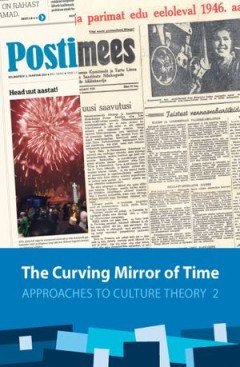
The Curving Mirror of Time
This volume attempts to create a ‘relief map’ of temporalities in Estonian newspapers over different periods of time. The special focus is on binding the empirical analysis to the theoretical and methodological discussions of the temporality of news(paper) culture. The authors of the articles ask to what extent newspapers report on the past and present and to what extent these reports refer…
- Edition
- -
- ISBN/ISSN
- 9789949322589
- Collation
- -
- Series Title
- -
- Call Number
- -
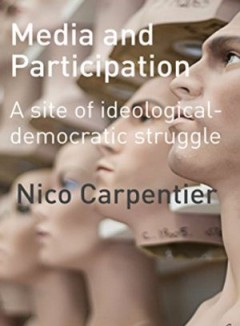
Media and Participation A site of ideological-democratic struggle
Participation has become fashionable again, but at the same time it has always played a crucial role in our contemporary societies, and it has been omnipresent in a surprisingly large number of societal fields. In the case of the media sphere, the present-day media conjuncture is now considered to be the most participatory ever, but media participation has had a long and intense history. To dea…
- Edition
- -
- ISBN/ISSN
- 9781841504070
- Collation
- -
- Series Title
- -
- Call Number
- -
 Computer Science, Information & General Works
Computer Science, Information & General Works  Philosophy & Psychology
Philosophy & Psychology  Religion
Religion  Social Sciences
Social Sciences  Language
Language  Pure Science
Pure Science  Applied Sciences
Applied Sciences  Art & Recreation
Art & Recreation  Literature
Literature  History & Geography
History & Geography